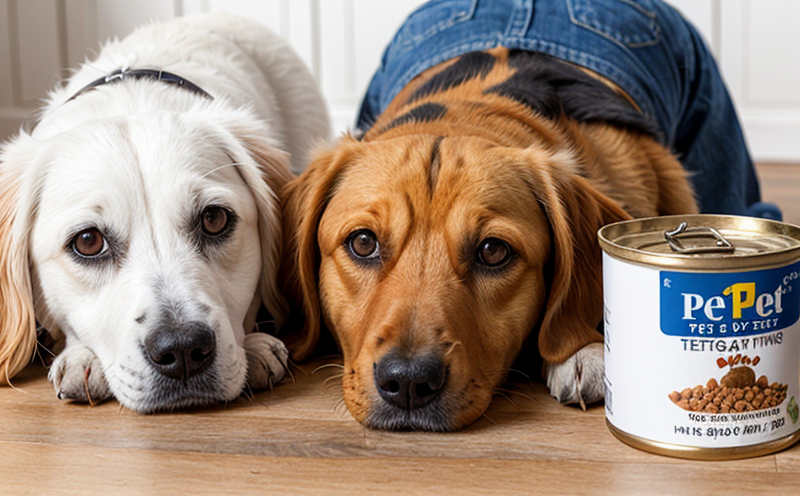ISO 12099 Protein Content Testing in Pet Food by NIR
The ISO 12099-1 standard provides a robust methodology for determining the protein content in pet food using Near-Infrared Reflectance (NIR) spectroscopy. This non-destructive and rapid technique allows laboratories to efficiently analyze large sample sets, ensuring accurate and consistent results without compromising product integrity.
Protein is one of the most critical components affecting pet nutrition, influencing growth, development, and overall health. The ISO 12099-1 standard ensures that pet food manufacturers can accurately measure protein content to meet nutritional requirements specified in regulations such as those set by the Association of American Feed Control Officials (AAFCO) and the European Commission.
Our laboratory utilizes state-of-the-art NIR spectrometers, which are calibrated according to ISO standards. The process begins with a thorough sample preparation that involves grinding and homogenizing pet food samples to ensure uniformity across all test batches. This meticulous approach ensures that the protein content measured is representative of the entire batch.
Once prepared, the samples undergo NIR analysis in a controlled environment. The NIR spectrometer captures light reflection data from the sample, which is then processed through specialized software to calculate protein content based on predefined calibration models. These models are regularly updated and validated against reference methods like Kjeldahl nitrogen determination.
The results generated by our laboratory adhere strictly to ISO 12099-1 guidelines, ensuring that they can be relied upon for compliance purposes as well as internal quality control measures. Our team of experts ensures that each analysis meets the highest standards, providing pet food manufacturers with accurate and actionable insights into their product's nutritional profile.
The precision and speed of NIR-based protein content testing make it an indispensable tool in the pet food industry. By reducing turnaround times significantly compared to traditional methods like Kjeldahl nitrogen determination, our service allows for quicker decision-making regarding formulation adjustments or quality control measures. This is particularly beneficial during product development stages where rapid iteration cycles are common.
Moreover, compliance with ISO standards enhances consumer trust by demonstrating a commitment to producing safe and nutritious pet food products that meet regulatory requirements. For R&D teams within pet food companies, this service offers valuable data points for ongoing research into optimizing ingredient blends while maintaining or enhancing nutritional quality.
Quality and Reliability Assurance
At our laboratory, we place a strong emphasis on quality assurance throughout every step of the ISO 12099-1 protein content testing process. Our team follows strict protocols to ensure that each sample is handled with care and precision, minimizing potential sources of error.
- Sample preparation is conducted in a dedicated area free from contamination risks.
- The NIR spectrometers are regularly calibrated against certified reference materials according to ISO 17025 standards.
- Data processing software is updated annually and validated through inter-laboratory comparisons.
- All analysts undergo continuous training in both theoretical knowledge and practical skills related to NIR technology.
We also maintain robust quality control measures, including internal audits and external proficiency testing programs. These initiatives help us identify areas for improvement and continuously refine our analytical techniques. Our goal is not only to meet but exceed expectations regarding accuracy, repeatability, and reproducibility of results.
Customer Impact and Satisfaction
The ISO 12099-1 protein content testing service directly impacts several aspects of pet food production and quality assurance. For manufacturers, it provides a reliable method to verify nutritional claims made on packaging labels, which is essential for maintaining consumer confidence.
For R&D teams within pet food companies, this service offers valuable insights into ingredient performance during different stages of product development. It enables them to make informed decisions about formulation adjustments aimed at optimizing nutritional content while ensuring palatability and digestibility.
In terms of compliance, the ISO 12099-1 standard helps pet food manufacturers stay ahead of regulatory changes by providing consistent and accurate data for meeting legal requirements set forth by organizations like AAFCO and the European Commission. This ensures that all products comply with safety standards and nutritional guidelines.
For procurement departments, having access to precise protein content information allows them to source high-quality raw materials more effectively, thereby improving overall product quality at a lower cost.
Use Cases and Application Examples
- Formulation Optimization: Analyzing protein content during various stages of development helps identify optimal ingredient combinations for achieving desired nutritional profiles.
- Batch Verification: Regularly checking batch consistency ensures that all produced batches meet specified protein content levels, enhancing product uniformity.
- Label Compliance: Accurate protein content measurements support the accuracy of nutritional claims on packaging labels, fostering trust among consumers.
- Quality Control: Implementing this service as part of routine quality checks helps catch any deviations from expected values early in the production process.
- Ingredient Evaluation: Evaluating new ingredients based on their protein content contribution can aid in selecting those that best fit specific product needs.





